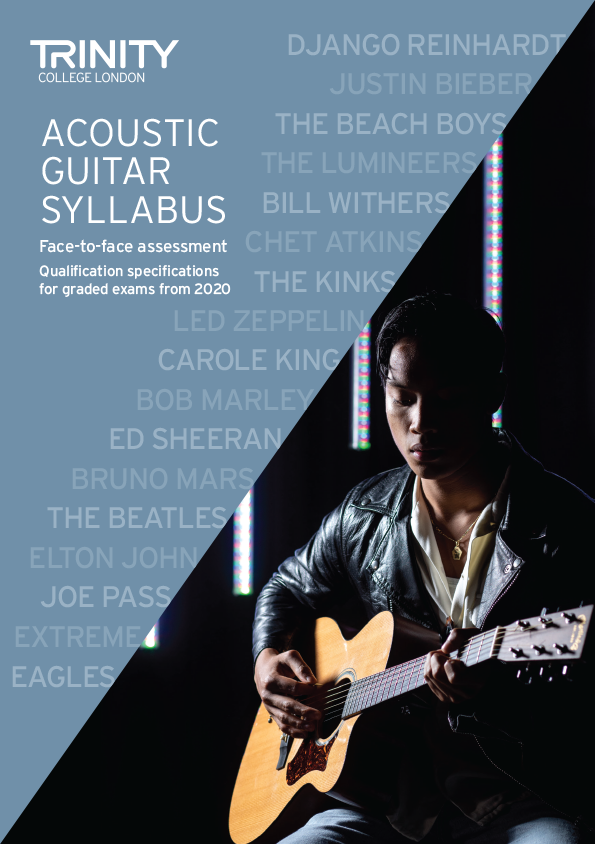Our Music Grade and Diploma exams are available both in digital and face-to-face formats.
Find out more about digital exams
Exam booking
Within the UK:
Book digital exams Book face to face examsOutside the UK:
Book all drama exams via your local Trinity representative.
Change to Guitar syllabus arrangements
Effective immediately, Trinity’s Acoustic Guitar syllabus will no longer operate with an end date. The current syllabus will remain valid indefinitely, and any necessary planned updates will be announced at least 12 months in advance.
Trinity will continue to increase the repertoire available to candidates through an ongoing programme of new publication releases. This will include a diverse range of exciting exam books, individual digital downloads, ebooks, anthologies and more. Most repertoire and technical work will remain indefinitely*. Advance notice of new publication releases will be available on the Acoustic Guitar webpage and the shop.
This innovative change in approach to our music exam syllabuses will make our exams more accessible, provide rich and ever-increasing repertoire to choose from, and encourage candidates to continue performing the music they love for as long as they wish.
* copyright and territory dependent
Trinity offers today’s guitarists a broad range of styles and techniques to choose from. In addition to the Acoustic Guitar syllabus, Trinity offers Classical Guitar and Rock & Pop Guitar.
Find out more about Classical Guitar
Overview of Trinity’s Guitar qualifications
The Acoustic Guitar Syllabus from 2020
This syllabus reinvents the previous Plectrum Guitar syllabus to recognise the importance of the acoustic guitar in today’s music. We’ve kept the most popular plectrum guitar pieces but added a much wider range of styles and technical work. This ensures that guitarists develop the blend of fingerstyle and plectrum technique they need to play the music they know and love.
Styles
This syllabus bridges the gap between classical and electric guitar incorporating folk, acoustic, rock and pop, jazz, blues and country styles. Explore pieces by Ed Sheeran, Bob Marley and Led Zeppelin alongside Django Reinhardt and Chet Atkins - all available in both standard notation and TAB.
Technique
The technical work is relevant to a range of popular music styles, including chord patterns and progressions, jazz scales, blues scales and modes, in addition to standard scales and arpeggios. Many of the pieces, particularly at the lower grades, can be played with fingers or plectrum.
Books and backing
There are three books available – for Initial-Grade 2, Grades 3-5 and Grades 6-8 – which contain a wide range of styles, allowing candidates to follow distinct stylistic pathways as they progress. Backing tracks recorded by professional session players allow guitarists to learn crucial ensemble skills by practising as part of a band.
Pro-skills
The syllabus is designed to reflect real-life demands and so includes material which features the different roles that an acoustic guitarist can fulfil: as a self-contained solo instrument, as a solo lead-line instrument or as an accompanying instrument. Developed by professional guitarists our online support resources show you what an exam is like, explore professional technique and look at where our exams can take you.
We offer acoustic guitar exams from Initial to Grade 8. The Initial exam acts as an introduction to the exam system for new performers.
Further information
Full details (including our procedures, syllabus requirements, what to expect, and what to bring with you) can be found in our Information & Regulations.
Related products
NoteLab Music is a powerful resource available to teachers, parents and students to support lessons, personalise music choices, build technique, maintain engagement and track progress.
Our Theory of Music syllabus responds to modern teaching and learning styles and can be taken as a paper-based exam or as on on-demand digital exam.


